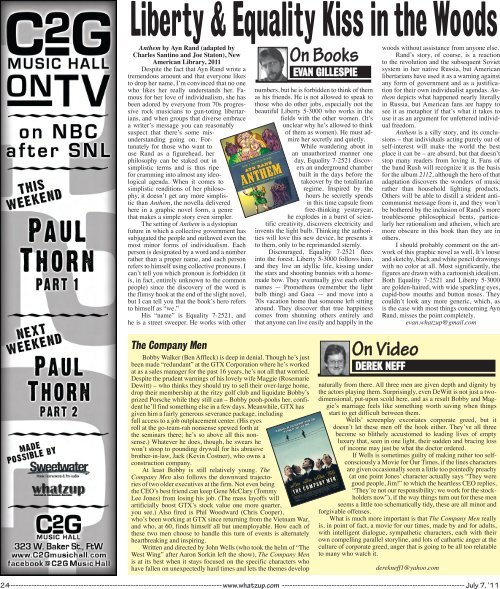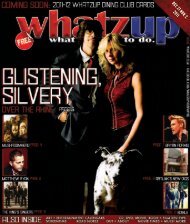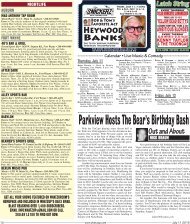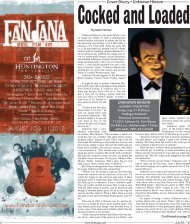24--------------------------------------------------------------------------------- www.whatzup.com- ---------------------------------------------------------------------- <strong>July</strong> 7, ’11Liberty & Equality Kiss in the WoodsAnthem by Ayn Rand (adapted bywoods without assistance from anyone else.Charles Santino and Joe Staton), NewRand’s story, of course, is a reactionAmerican Library, <strong>2011</strong>On Booksto the revolution and the subsequent SovietDespite the fact that Ayn Rand wrote asystem in her native Russia, but Americantremendous amount and that everyone likes EVAN GILLESPIE libertarians have used it as a warning againstto drop her name, I’m convinced that no onewho likes her really understands her. Famousfor her love of individualism, she hasbeen adored by everyone from 70s progressiverock musicians to gun-toting libertarians,and when groups that diverse embracea writer’s message you can reasonablysuspect that there’s some misunderstandinggoing on. Fortunatelyfor those who want touse Rand as a figurehead, herphilosophy can be staked out insimplistic terms and is thus ripefor cramming into almost any ideologicalagenda. When it comes tosimplistic renditions of her philosophy,it doesn’t get any more simplisticthan Anthem, the novella deliveredhere in a graphic novel form, a genrethat makes a simple story even simpler.The setting of Anthem is a dystopianfuture in which a collective government hassubjugated the people and outlawed even themost minor forms of individualism. Eachperson is designated by a word and a numberrather than a proper name, and each personrefers to himself using collective pronouns. Ican’t tell you which pronoun is forbidden (itis, in fact, entirely unknown to the commonpeople) since the discovery of the word isthe flimsy hook at the end of the slight novel,but I can tell you that the book’s hero refersto himself as “we.”His “name” is Equality 7-2521, andhe is a street sweeper. He works with othernumbers, but he is forbidden to think of themas his friends. He is not allowed to speak tothose who do other jobs, especially not thebeautiful Liberty 5-3000 who works in thefields with the other women. (It’sunclear why he’s allowed to thinkof them as women). He must admireher secretly and quietly.While wandering about inan unauthorized manner oneday, Equality 7-2521 discoversan underground chamberbuilt in the days before thetakeover by the totalitarianregime. Inspired by thehours he secretly spendsin this time capsule fromfree-thinking yesteryear,he explodes in a burst of scientificcreativity, discovers electricity andinvents the light bulb. Thinking the authoritieswill love this new device, he presents itto them, only to be reprimanded sternly.Discouraged, Equality 7-2521 fleesinto the forest. Liberty 5-3000 follows him,and they live an idyllic life, kissing underthe stars and shooting bunnies with a homemadebow. They eventually give each othernames — Prometheus (remember the lightbulb thing) and Gaea — and move into a70s vacation home that someone left sittingaround. They discover that true happinesscomes from shunning others entirely andthat anyone can live easily and happily in theany form of government and as a justificationfor their own individualist agendas. Anthemdepicts what happened nearly literallyin Russia, but American fans are happy tosee it as metaphor if that’s what it takes touse it as an argument for unfettered individualfreedom.Anthem is a silly story, and its conclusions– that individuals acting purely out ofself-interest will make the world the bestplace it can be – are absurd, but that doesn’tstop many readers from loving it. Fans ofthe band Rush will recognize it as the basisfor the album 2112, although the hero of thatadaptation discovers the wonders of musicrather than household lighting products.Others will be able to distill a strident anticommunistmessage from it, and they won’tbe bothered by the inclusion of Rand’s moretroublesome philosophical bents, particularlyher rationalism and atheism, which aremore obscure in this book than they are inothers.I should probably comment on the artworkof this graphic novel as well. It’s looseand sketchy, black and white pencil drawingswith no color at all. Most significantly, thefigures are drawn with a cartoonish idealism.Both Equality 7-2521 and Liberty 5-3000are golden-haired, with wide sparkling eyes,cupid-bow mouths and button noses. Theycouldn’t look any more generic, which, asis the case with most things concerning AynRand, misses the point completely.evan.whatzup@gmail.comThe Company MenBobby Walker (Ben Affleck) is deep in denial. Though he’s justbeen made “redundant” at the GTX Corporation where he’s workedat as a sales manager for the past 16 years, he’s not all that worried.Despite the prudent warnings of his lovely wife Maggie (RosemarieDewitt) – who thinks they should try to sell their over-large home,drop their membership at the ritzy golf club and liquidate Bobby’sprized Porsche while they still can – Bobby pooh-poohs her, confidenthe’ll find something else in a few days. Meanwhile, GTX hasgiven him a fairly generous severance package, includingfull access to a job outplacement center. (His eyesroll at the go-team-rah nonsense spewed forth atthe seminars there; he’s so above all this nonsense.)Whatever he does, though, he swears hewon’t stoop to pounding drywall for his abrasivebrother-in-law, Jack (Kevin Costner), who owns aconstruction company.At least Bobby is still relatively young. TheCompany Men also follows the downward trajectoriesof two older executives at the firm. Not even beingthe CEO’s best friend can keep Gene McClary (TommyLee Jones) from losing his job. (The mass layoffs willartificially boost GTX’s stock value one more quarter,you see.) Also fired is Phil Woodward (Chris Cooper),who’s been working at GTX since returning from the Vietnam War,and who, at 60, finds himself all but unemployable. How each ofthese two men choose to handle this turn of events is alternatelyheartbreaking and inspiring.Written and directed by John Wells (who took the helm of “TheWest Wing” after Aaron Sorkin left the show), The Company Menis at its best when it stays focused on the specific characters whohave fallen on unexpectedly hard times and lets the themes developOn VideoDEREK NEFFnaturally from there. All three men are given depth and dignity bythe actors playing them. Surprisingly, even DeWitt is not just a twodimensional,put-upon scold here, and as a result Bobby and Maggie’smarriage feels like something worth saving when thingsstart to get difficult between them.Wells’ screenplay excoriates corporate greed, but itdoesn’t let these men off the hook either. They’ve all threebecome so blithely accustomed to leading lives of emptyluxury that, seen in one light, their sudden and bracing lossof income may just be what the doctor ordered.If Wells is sometimes guilty of making rather too selfconsciouslya Movie for Our Times, if the lines charactersare given occasionally seem a little too pointedly preachy(at one point Jones’ character actually says “They weregood people, Jim!” to which the heartless CEO replies,“They’re not our responsibility; we work for the stockholdersnow”), if the way things turn out for these menseems a little too schematically tidy, these are all minor andforgivable offenses.What is much more important is that The Company Men reallyis, in point of fact, a movie for our times, made by and for adults,with intelligent dialogue, sympathetic characters, each with theirown compelling parallel storyline, and lots of cathartic anger at theculture of corporate greed, anger that is going to be all too relatableto many who watch it.derekneff1@yahoo.com
<strong>July</strong> 7, ’11------------------------------------------------------------------------ www.whatzup.com- ------------------------------------------------------------------------------- 25------- Feature • West Side Story--------Tonight TonightBy Michele DeVinneyFor the last 14 years manydedicated students have put theirlove of musical theater ahead oftheir love of summer vacation.With this year’s production ofWest Side Story, performed as usualon the North Side High Schoolstage, students from 15 differentlocal schools will put their talentsto the test, tackling one of the mostbeloved and rigorous of all Broadwayshows.Kirby Volz, longtime NorthSide theater instructor and a talentedperformer in his own right,has overseen the summer theaterofferings for the duration of theirrun and has seen his share of talentedteenagersoverthe years.The currentcrops e e m e dworthy ofthis year’schoice.“We s tSide Storyis the oneshow I’ven e v e rdone,” says Volz. “You’ve got tohave all the horses for it – the actors,the dancers, the musicians.Right now, knowing the kids wehave in the area high schools, itseemed like a good year to do it.I like the show a lot, but it’s verychallenging. But I knew these kidscould do it.”Filling the lead roles are performerswho have already establishedthemselves in their ownschools, with Andrew Sherman ofNorth Side playing Tony, SydneyNorwalk of Homestead playingMaria, Morgen Figel of BishopLuers playing Anita and EmilioBolton of Carroll filling the roleof Bernardo. West Side Story has alarge cast, but working with a largenumber of kids is something Volzhas gotten used to during thesesummertime productions.“Our biggest was a coupleyears ago with Titanic, which had acast of 80. But we had 74 studentsaudition for the roles in West SideStory, and the numbers of studentswho are interested in this continueto grow.”The audience for the show alsocontinues to grow, as Volz discoveredwhen working on a previoussummer production of Rent.“I had no clue that Rent wasgoing to be as big as it was, no clueat all. We had people in line aroundthe hallway, down the stairs, downthe other hall and out on the sidewalkfor that. I ran out of money inthe cash drawer to give change. Inever expected that.”Although Volz has staged awide range of musicals during histenure at North Side, includingPippin, The Secret Garden, Footlooseand Beauty and the Beast,he has a bit more latitude whenplanning for the summer theatreproductions.“We get to do things that mightbe harder to do for a regular highschool production, like Rent. Andeven Titanic. Titanic doesn’t haveany controversial material, butthe cast is just so large. And evenwith West Side Story, even thoughit’s a verytraditionalWEST SIDE STORYFri.-Sat., <strong>July</strong> 8-9 • 7:30 p.m.Sun., <strong>July</strong> 10 • 2 p.m.North Side High School475 E. State Blvd., Fort WayneTix.: $10 adults, $7 students($2 discount w/TRF button),www.summermusictheatre.compiece, it’salso verydifficult. Ilike to usethis productiontochallengethe kids,to add tothe theatercurriculumt h e y ’ r ealready doing. The dancing ishard, the vocals are hard, and youdefinitely have to have the actingchops for it.”By attracting the most committedof area theatre students,Volz knows that he can count onthe hours of effort required to pulloff a production of this magnitude.In fact, the only problems he encountersare when students areoverly committed to a variety ofperformances.“We hold auditions right beforeMemorial Day and then startrehearsals the Tuesday after MemorialDay. Then we have sevenweeks including tech week beforewe stage the show. These kids do itbecause they like theater and wantto do it. Once in awhile we havesomeone who has to go to showchoir camp, and this year one ofthe Jets had to leave for drum majorcamp, but we just work aroundit, make allowances. I don’t haveproblems with them becausethey’re doing what they want to bedoing.”Some of this year’s cast isback for their fifth or sixth timearound, having started in eighthgradeand sticking with it throughand beyond graduation. Shermangraduated in June, having won nu-Continued on page 31-------------------- Calendar • Stage & Dance--------------------Now PlayingHe l l o, Do l ly ! — The classic musicalabout a wannabee matchmakerworking in Yonkers at the turn of thecentury, at The Round Barn Theatreat Amish Acres, Nappanee, 2 & 8p.m. Wednesday-Sunday, thru<strong>July</strong> 7, $27.95, 800-800-4942Pl a i n & Fa n c y — A musical about asophisticated New York couple andtheir adventures in Amish Country,at The Round Barn Theatre atAmish Acres, Nappanee, 2 & 8p.m. thru Oct. 22 (call for dates),$27.95 (dinner theatre packagesavailable), 800-800-4942Sc a r l e t Fe v e r’s Sw e e t & So u r Su m m e rSh o w — Burlesque dancing at theThirsty Camel, Fort Wayne, 10p.m. Saturday, <strong>July</strong> 9, $6 adv., $8d.o.s., 420-0055St a t e Fa i r — The classic Rodgers andHammerstein musical about findingfun and love at the Iowa StateFair, at the Ramada Wagon WheelTheatre, Warsaw, 7 p.m. Thursday,<strong>July</strong> 7; 8 p.m. Friday-Saturday,<strong>July</strong> 8-9; 2 p.m. Sunday, <strong>July</strong>10; 7 p.m. Tuesday, <strong>July</strong> 12; 8p.m. Wednesday, <strong>July</strong> <strong>13</strong>; 2 & 8p.m. Thursday, <strong>July</strong> 14; 8 p.m.Friday-Saturday, <strong>July</strong> 15-16; $12-$30, 574-267-8041, www.wagonwheeltheatre.comWe s t Sid e St o r y — The classic musicalabout star-crossed lovers Mariaand Tony, at North Side High SchoolAuditorium, Fort Wayne, 7:30 p.m.Friday-Saturday, <strong>July</strong> 8-9 and 2p.m. Sunday, <strong>July</strong> 10, $10 adults,$7 students ($2 discount with ThreeRivers Festival button), www.summermusictheatre.comAsidesAUDITIONSSp o n ta n e o u s Gu t Bu s t i n’ Co m e d yTr o u p e — Comedy improvisorsneeded. Must be able to think onyour feet. Open to those 21 andolder. Call 755-0573 for more information.Mo o n l ig h t a n d Ma g n o l i as (Se p t.30-Oc t. 15) — Auditions at theArena Theatre Rehearsal Studio,Fort Wayne, 7 p.m. Sunday-Monday, Aug. 7-8, 424-5622Th e Ad v e n t u r e s o f To m Saw y e r (Oc t.7-9) — Actors needed for the FortWayne Youtheatre production,auditions at Arts United Center,Fort Wayne, 4-6 p.m. Tuesday-Wednesday, Sept. 6-7, 422-6900,www.fortwayneyoutheatre.orgPlanning CalendarJULYAn n i e Ge t Yo u r Gu n — The classicwestern musical about AnnieOakley and her romance withsharp shooter Frank Butler, at thePulse Opera House, Warren, <strong>July</strong>15-Aug. 6, $12 adults, $5 children,375-7017Ot h e l l o — The Shakespeareandrama about Iago’s attempts toconvince Othello that his belovedDesdemona has been unfaithful,performed by Shakespeare from theHeart, at Pagoda Pavilion, SwinneyPark, Fort Wayne, 7 p.m. Friday-Saturday, <strong>July</strong> 15-16 and 22-23,207-4556Ch i ld r e n o f Ed e n — The StephenSondheim musical based on thestory of Genesis, at PlymouthCongregational Church, FortWayne, 7 p.m. Friday, <strong>July</strong> 15& 2 p.m. Sunday, <strong>July</strong> 17, free,385-3691Am e r i c a n St y l e Ba l l r o o m In d e p e n d e n c eDay Sh o w c a s e — Both professionaland amateur ballroomdance demonstrations, including aperformance by Igor Litvinov andJulia Ivleva, United States StandardFinalists and North AmericanShowdance Champions, at GrandWayne Convention Center, FortWayne, 10 a.m.-11 p.m. Saturday,<strong>July</strong> 16, $7-$65 (price depends onshow), 480-7070Da n c e Th r o u g h t h e De c a d e: A Tr ib u t et o Tr o u p e Ta l e e b a — A celebrationof belly dance, at Masonic TempleAuditorium, Fort Wayne, 8 p.m.Saturday, <strong>July</strong> 16, $8 adv., $10 atthe door, 414-2639Big Ri v e r — Roger Miller’s musicalbased on the Mark Twainnovel about Huck Finn and hisfriend Jim, at the Ramada WagonWheel Theatre, Warsaw, 8 p.m.Wednesday, <strong>July</strong> 20; 7 p.m.Thursday, <strong>July</strong> 21; 8 p.m. Friday-Saturday, <strong>July</strong> 22-23; 2 p.m.Sunday, <strong>July</strong> 24; 7 p.m. Tuesday,<strong>July</strong> 26; 8 p.m. Wednesday, <strong>July</strong>27; 2 & 8 p.m. Thursday, <strong>July</strong>28; 8 p.m. Friday-Saturday, <strong>July</strong>29-30; $12-$30, 574-267-8041,www.wagonwheeltheatre.com260.424.5220fwcivic.orgA Tony Awardwinner for Best MusicalHa i rs p r ay — The musical comedyabout plus-size heroineTracy Turnblad and her pursuit offame and racial justice via dancingon The Corny Collins Show.Presented by Civic Theatre, at ArtsUnited Center, Fort Wayne, 8 p.m.Saturday, <strong>July</strong> 23; 2 p.m. Sunday,<strong>July</strong> 24; 8 p.m. Friday-Saturday,<strong>July</strong> 29-30; 2 p.m. Sunday, <strong>July</strong>31; 8 p.m. Friday-Saturday, Aug.5-6; 2 p.m. Sunday, Aug. 7, $26adults, $22 seniors, $18 students,424-5220, www.fwcivic.orgTo Ca t c h a Cl u e — An audienceparticipationcomedy about crime onthe cruise ship S. S. Whatamess,by Bower North Productions, atFort Wayne Marriott, 6:30 p.m.Saturday, <strong>July</strong> 23, $35, 484-0411Ri ng o f Fi r e — The story of JohnnyCash through 38 of his hit songs, atthe Round Barn Theatre at AmishAcres, Nappanee, <strong>July</strong> 26-Aug.10 (call theater for times), $31.23(student and child discounts available),800-800-4942AUGUSTLe n d Me a Te n o r — A comic playabout mistaken identity andother hijinks at the ClevelandOpera Company, at the RamadaWagon Wheel Theatre, Warsaw,8 p.m. Wednesday, Aug. 3; 7p.m. Thursday, Aug. 4; 8 p.m.Friday-Saturday, Aug. 5-6; 2 p.m.Sunday, Aug. 7; 7 p.m. Tuesday,Aug. 9; 8 p.m. Wednesday, Aug.10; 2 & 8 p.m. Thursday, Aug.11; 8 p.m. Friday-Saturday, Aug.12-<strong>13</strong>; $12-$30, 574-267-8041,www.wagonwheeltheatre.comCritic’s Ch o i c e — A comedy abouta theater critic who must decidewhether or not to review his wife’sterrible play, at Arena DinnerTheatre, Fort Wayne, 7 p.m.dinner, 8 p.m. curtain, Friday-Saturday, Aug. 5-6, 12-<strong>13</strong> and19-20, $35, 424-5622“You Can’t Stop The Beat” or keep TracyTurnblad down! Our loveable plus-size heroinewins a spot on the TV airwaves singing anddancing on The Corny Collins Show. She’san overnight teen celebrity but still battles tointegrate the show and find true love. Hairspraytakes you back to the changing world of the1960’s with “The Nicest Kids In Town,” “I CanHear The Bells,” and “(It’s) Hairspray.”Sponsored in part by
















